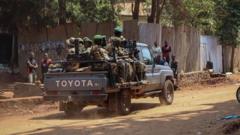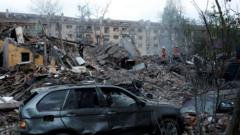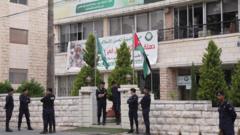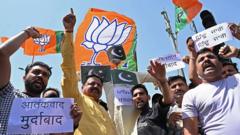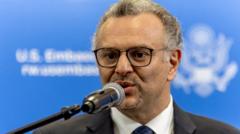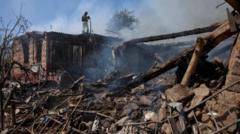Ukrainian President Volodymyr Zelensky has cut short his visit to South Africa in response to a deadly Russian missile and drone attack on Kyiv, which killed at least nine and injured over 70. His decision comes amid ongoing international discussions regarding peace negotiations and territorial concessions in the conflict with Russia.
Zelensky Shortens South Africa Trip Following Kyiv Attack

Zelensky Shortens South Africa Trip Following Kyiv Attack
Ukrainian President cancels visit after deadly Russian strikes on the capital.
In a troubling turn of events, Ukrainian President Volodymyr Zelensky has canceled significant portions of his inaugural visit to South Africa following a devastating missile and drone attack by Russia on Kyiv. Local officials reported that the overnight assault resulted in at least nine fatalities and over 70 injuries, including children. In a post on X, Zelensky expressed his intention to return to Ukraine "immediately" after his meeting with South African President Cyril Ramaphosa. He noted that rescue operations were actively continuing in the aftermath of the attack, which caused "significant destruction."
The timing of this attack raises questions about diplomatic efforts, as Zelensky also remarked on the effects of a proposed full ceasefire, which Ukraine had agreed to 44 days prior, a plan supported by the United States. Commenting on peace negotiations, former US President Donald Trump accused Zelensky of undermining the process by refusing to recognize Russian control over Crimea, a region that Russia illegally annexed in 2014.
Trump stated that a resolution to the conflict was “very close”, but that Zelensky's stance would only prolong hostilities. Meanwhile, US Vice-President JD Vance presented a vision for a potential agreement, suggesting that it would necessitate both Ukraine and Russia giving up certain territories, although he did not elaborate on specific areas involved.
At a press briefing, Trump shifted the focus towards ending the war rather than discussing the recognition of Russia's claims in Crimea, a demand Zelensky would find politically untenable and legally questionable under international norms that prohibit altering borders by force. This incident underscores the fragile nature of ceasefire discussions amidst the ongoing conflict and the escalating tensions surrounding territorial integrity in Ukraine.
The timing of this attack raises questions about diplomatic efforts, as Zelensky also remarked on the effects of a proposed full ceasefire, which Ukraine had agreed to 44 days prior, a plan supported by the United States. Commenting on peace negotiations, former US President Donald Trump accused Zelensky of undermining the process by refusing to recognize Russian control over Crimea, a region that Russia illegally annexed in 2014.
Trump stated that a resolution to the conflict was “very close”, but that Zelensky's stance would only prolong hostilities. Meanwhile, US Vice-President JD Vance presented a vision for a potential agreement, suggesting that it would necessitate both Ukraine and Russia giving up certain territories, although he did not elaborate on specific areas involved.
At a press briefing, Trump shifted the focus towards ending the war rather than discussing the recognition of Russia's claims in Crimea, a demand Zelensky would find politically untenable and legally questionable under international norms that prohibit altering borders by force. This incident underscores the fragile nature of ceasefire discussions amidst the ongoing conflict and the escalating tensions surrounding territorial integrity in Ukraine.






